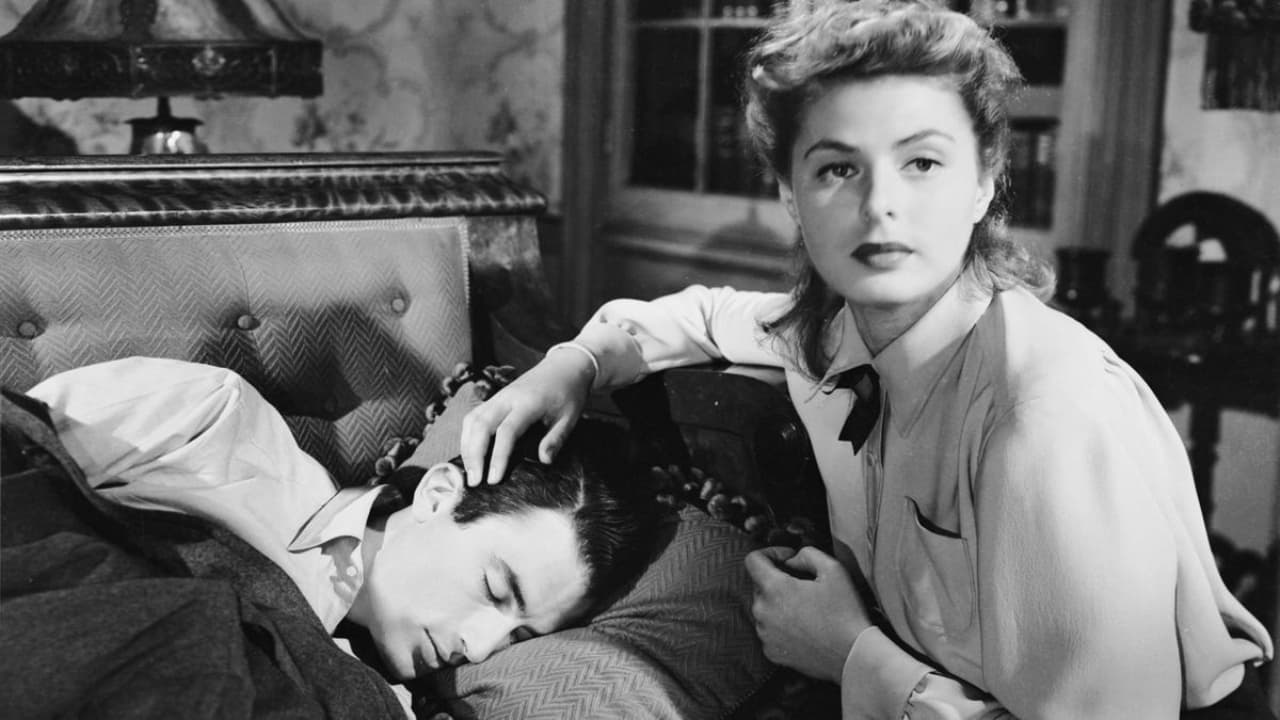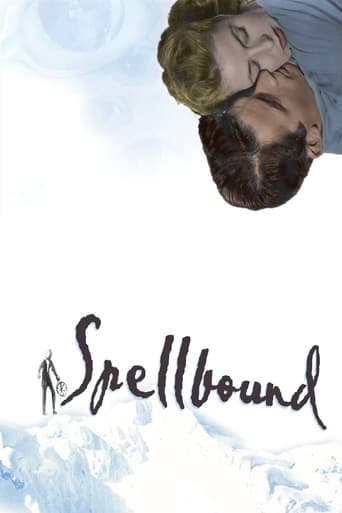

In his excellent study of Ingrid Bergman for the Pyramid Illustrated History of the Movies series, Curtis F. Brown tells exactly what is wrong with Spellbound: "In addition to Gregory Peck's callow appearance and wooden acting, the film has other serious faults. One is its pretentious and simplistic 'dream sequence. Another is the dialogue." Most of the picture is thrown Bergman's way and she is such an accomplished actress and lights up the screen with such a charismatic inner radiance that it doesn't really matter what she says. The logical, pragmatic side of our brain is only half-listening. And as for Peck, for once his very shallowness and lack of presence is ideally suited for the part he is called upon to play. The support cast, led by Leo G. Carroll, is also sufficiently professional to either smooth out or neatly contrast the gauche acting of the amateurish Peck. Though why Michael Chekhov was honored with a Supporting Actor nomination is beyond me. Competent enough he certainly is, but he is among the least interesting of the supporting line-up. Other names that spring to mind well before Chekhov' are John Emery, Rhonda Fleming, Norman Lloyd and Wallace Ford. The Criterion DVD can be thoroughly recommended.
... View Morenot the story, not the incredible situations, maybe, not the tension are the good points of this admirable film. but the high, rare, delicate and seductive romanticism. gestures, dialogues, looks. and the slices of silence. each, all, are pillars/ingredients of a splendid story and example of magnificent acting. the use of vulnerability of the two lead characters for an emotional story about self definition as basis of profound, gorgeous love story is the true motif for to admire and see, again and again, this fascinating drama . sure, it is not surprising. great actors, great director, impeccable script. but the spell of a story about confuse identities, a crime and a dark game has, in the case of Spellbound, special chemistry. and that defines it in the most seductive manner.
... View MoreFor a number of reasons this is one of my favorite Hitchcock films.My review is based on the Blu Ray edition of the film, and let me begin by commenting about that. If you already have the DVD version, I don't think you're going to gain much by moving to the Blu Ray edition. Some have questioned whether Ingrid Bergman was an appropriate choice as a psychiatrist. I have no problems with her portrayal, in fact I rather enjoyed it. I also thought that she and Gregory Peck had great chemistry in this film...and of course, they did have a brief affair according to Peck after Bergman died.Gregory Peck is excellent here...as always. This was only Peck's fourth film, but he was already reaching the peak of his career with a number of strong performances around this time.Leo G. Carroll, one of Hitchcock's favorite supporting actors, is here, and I enjoyed his portrayal as the departing head of the psychiatric institution.Michael Chekhov is wonderful as the professor-mentor of Ingrid Bergman. It's a charming portrayal of an old-world psychiatrist.An interesting small part is played by Rhonda Fleming as a psychiatric patient who lusts over men but hates them.Of course, the highlight of the film is the dream sequence which was designed by Salvador Dali. Unfortunately in the final editing for release the almost 20 minute dream sequence was cut to about 2 minutes. Personally, my only real criticism about this film is that the balance between action suspense and dialog is decidedly on the side of dialog. However, it's good dialog. And, it's through memory flashes and dialog that Peck's character slowly begins to piece together the mystery in his life, It's really quite intriguing how Hitchcock very slowly and gradually leads the characters and the audience into discovering the truth. Incidentally, the musical score is excellent here, though rather repetitive. To me, at least, the ending was a surprise.I give this film an "8", albeit a weak "8". What puts it beyond a "7" for me is that the film is relatively unique, particularly for the mid-1940s.
... View MoreBy the mid-1940s, public awareness of Freudian theories had grown to the point where the time was right to make a thriller in which psychoanalysis featured strongly and Alfred Hitchcock's "Spellbound" does just that. Its plot involves murder, romance and a false identity but also focuses on amnesia, a guilt complex and the manifestations of a childhood trauma. This combination of story elements works well in creating interest and suspense, as well as providing scope for the considerable amount of visual flair that's evident, especially in a dream sequence (that was designed by Salvador Dali), an imaginatively staged suicide and a vision of a series of doors opening symbolically, in a scene where a couple kiss.By today's standards, what transpires in terms of dream analysis and the simplicity with which patients can overcome their problems through psychoanalysis, seems simplistic and dumbed-down but fortunately doesn't detract too greatly from the enjoyment of watching this movie which achieved great commercial success and was nominated for 6 Academy Awards.When Dr Murchison (Leo G Carroll), the director of Green Manors mental institution in Vermont, has to retire after suffering a period of nervous exhaustion, Dr Anthony Edwardes (Gregory Peck) is appointed to succeed him. All the members of staff are immediately surprised by how young their new boss is and when he's introduced to Dr Constance Petersen (Ingrid Bergman) there's an obvious mutual attraction. As the couple get to know each other, it quickly becomes apparent that Edwardes gets very agitated and dizzy every time he sees a series of parallel lines and soon Constance also discovers that he's an impostor.After Constance asks him about his identity, he admits that he's suffering from memory loss and doesn't know who he is, but is certain that he killed the real Dr Edwardes. He discovers from the cigarette case in his jacket pocket, that his initials must be J.B. and that night leaves Constance a note to inform her that he's left the institution to go to the Empire State Hotel in New York. The police start to investigate the real Dr Edwardes' disappearance and want to locate "J.B.". Constance is convinced that the man she loves is innocent and after pursuing him to his hotel takes him to Rochester to meet her elderly mentor, Dr Brulov (Michael Chekhov).At Brulov's residence, J.B. describes one of his dreams which Constance and Brulov then interpret to unravel the mystery of J.B.'s real identity, the source of his guilt complex and what he believes happened to the real Dr Edwardes.Surrealists and psychoanalysts share a preoccupation with the workings of the unconscious mind and Salvador Dali's contribution to this movie is a real highlight as is the suicide scene near the end which ends with a gun firing towards the audience and a red flash (the only colour seen in this black and white movie).Ingrid Bergman is outstanding as the psychoanalyst who's very dedicated and well-respected but general regarded by her colleagues as being frigid until her new boss arrives on the scene. Gregory Peck does well as the mysterious amnesiac and Michael Chekhov is wonderfully eccentric as Constance's old professor who, at one point, says "Good night and sweet dreams.........which we'll analyse at breakfast".
... View More